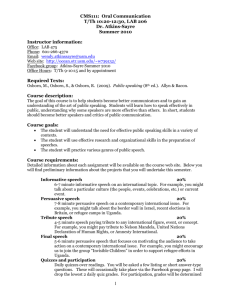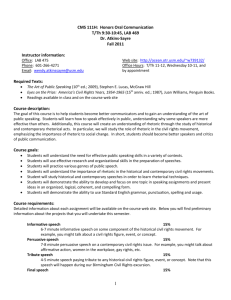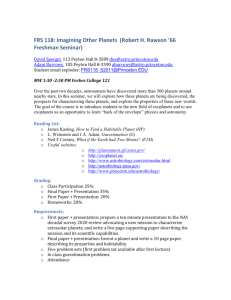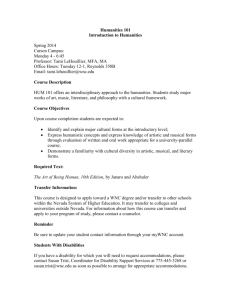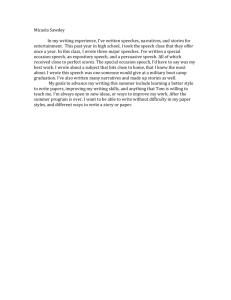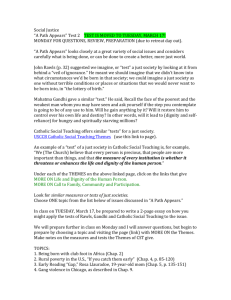SCM 111: Honors Oral Communication
advertisement
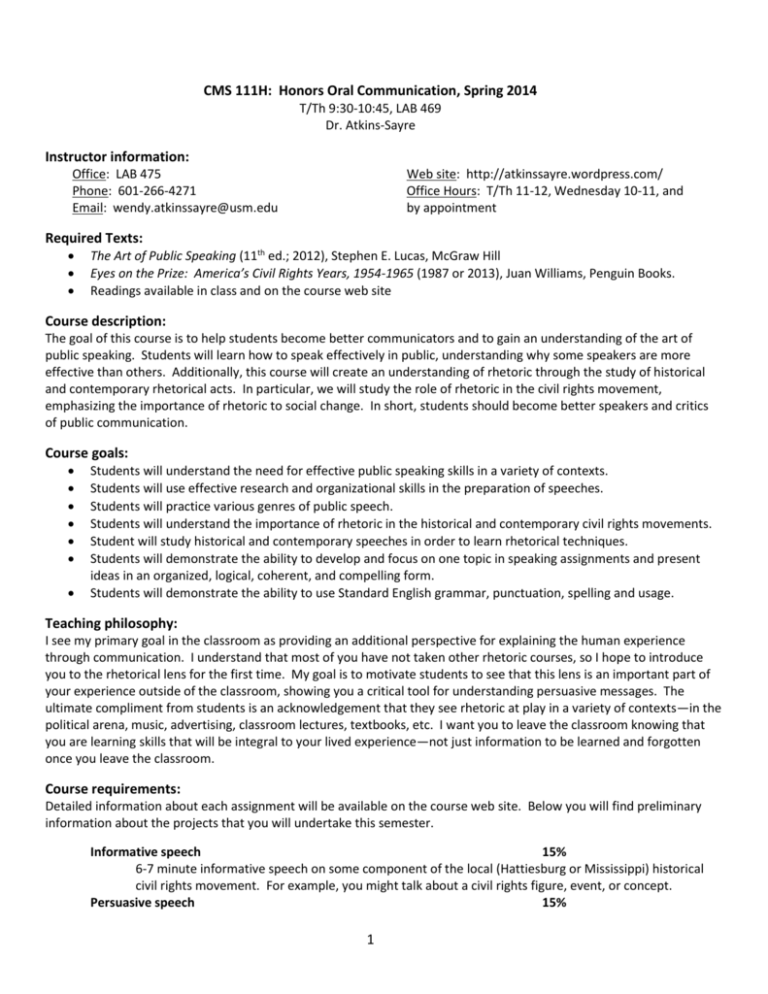
CMS 111H: Honors Oral Communication, Spring 2014 T/Th 9:30-10:45, LAB 469 Dr. Atkins-Sayre Instructor information: Office: LAB 475 Phone: 601-266-4271 Email: wendy.atkinssayre@usm.edu Web site: http://atkinssayre.wordpress.com/ Office Hours: T/Th 11-12, Wednesday 10-11, and by appointment Required Texts: The Art of Public Speaking (11th ed.; 2012), Stephen E. Lucas, McGraw Hill Eyes on the Prize: America’s Civil Rights Years, 1954-1965 (1987 or 2013), Juan Williams, Penguin Books. Readings available in class and on the course web site Course description: The goal of this course is to help students become better communicators and to gain an understanding of the art of public speaking. Students will learn how to speak effectively in public, understanding why some speakers are more effective than others. Additionally, this course will create an understanding of rhetoric through the study of historical and contemporary rhetorical acts. In particular, we will study the role of rhetoric in the civil rights movement, emphasizing the importance of rhetoric to social change. In short, students should become better speakers and critics of public communication. Course goals: Students will understand the need for effective public speaking skills in a variety of contexts. Students will use effective research and organizational skills in the preparation of speeches. Students will practice various genres of public speech. Students will understand the importance of rhetoric in the historical and contemporary civil rights movements. Student will study historical and contemporary speeches in order to learn rhetorical techniques. Students will demonstrate the ability to develop and focus on one topic in speaking assignments and present ideas in an organized, logical, coherent, and compelling form. Students will demonstrate the ability to use Standard English grammar, punctuation, spelling and usage. Teaching philosophy: I see my primary goal in the classroom as providing an additional perspective for explaining the human experience through communication. I understand that most of you have not taken other rhetoric courses, so I hope to introduce you to the rhetorical lens for the first time. My goal is to motivate students to see that this lens is an important part of your experience outside of the classroom, showing you a critical tool for understanding persuasive messages. The ultimate compliment from students is an acknowledgement that they see rhetoric at play in a variety of contexts—in the political arena, music, advertising, classroom lectures, textbooks, etc. I want you to leave the classroom knowing that you are learning skills that will be integral to your lived experience—not just information to be learned and forgotten once you leave the classroom. Course requirements: Detailed information about each assignment will be available on the course web site. Below you will find preliminary information about the projects that you will undertake this semester. Informative speech 15% 6-7 minute informative speech on some component of the local (Hattiesburg or Mississippi) historical civil rights movement. For example, you might talk about a civil rights figure, event, or concept. Persuasive speech 15% 1 7-8 minute persuasive speech on a contemporary civil rights issue. For example, you might talk about poverty in the US, international rights issues, gay rights, etc. Tribute speech 15% 4-5 minute speech paying tribute to any historical civil rights figure, event, or concept. Note that this speech will happen during our Birmingham Civil Rights excursion. Final speech 15% 7-8 minute persuasive speech that focuses on motivating the audience to take action on a contemporary civil rights issue. Quizzes 15% Daily quizzes over readings. You will be asked a few listing or short answer-type questions. These will occasionally take place outside of class (electronically). I will drop the lowest 2 daily quiz grades. Self-evaluations and class participation 15% You will record your speeches and complete brief analysis papers after each speech. Participating in class discussions and in- and out-of-class-assignments. Hattiesburg/Birmingham Civil Rights trip/assignment 10% As a mandatory part of the class, we will take two trips. The first will be a half-day driving tour around Hattiesburg to see local civil rights sites on Friday, February 7, from 3-7 pm. The second trip will be to Birmingham, Alabama, to view the Civil Rights Institute, Kelly Ingram Park, and the 16th Street Baptist Church on Friday, April 25 and Saturday, April 26. Most travel expenses (transportation, hotel, and museum fees; not food) will be covered by the University. Please make sure to block out those three days on your calendar. If you are unable to make the trips, you will need to drop the class. There will be a video project that will tie together the experiences. Course policies: 1. Participation: I expect all individuals to participate in class discussions, assignments, and exercises. The course 2. 3. 4. 5. 6. cannot succeed without that participation. Consequently, you should read the assigned materials on the assigned days and come to class ready to interact in discussion or activity. I also encourage you to participate in your class grade throughout the semester by keeping track of grades and making appointments with me if you are concerned. Late work: Because your assignments are primarily speeches, late work is practically impossible. Late speeches take away class time, thus inconveniencing the instructor and the entire class. Unless you have to miss a speech day for an emergency or serious illness, you will not be allowed to make up speeches and will be granted a zero for the assignment. If an emergency arises or you have a serious illness, you need to be in touch with me as soon as possible. Attendance: I expect you to be in class everyday and on time. Absences will affect your participation and quiz grades. It is your responsibility to find out what happened on all missed days. Any assignments will be due on the due date at the beginning of class regardless of your absence (unless we have reached an agreement). Grievance procedure: If you are dissatisfied with a grade (after carefully reading instructor comments), you will need to submit a typed argument explaining why you disagree with the grade. The paper should specifically mention why you disagree with the grade and use support (textbook, class notes, etc.) where appropriate. This paper will need to be given to me within one week after receiving the grade. I will then read the argument and respond either in writing, via email, or in a meeting. Please note: I will not discuss individual grades in the classroom. Classroom rules: Please be on time to class; I often make announcements that you will need to hear. Please refrain from distracting behavior (ringing/buzzing phones, texting, online communication) during class. In short, be considerate. Computer proficiency: Students enrolled in this course must have Internet access available to them, including email, web access, and Blackboard, and have the basic knowledge needed to efficiently use these Internet technologies. All course assignments will be posted on the course web site. You will be responsible for retrieving documents (syllabus, assignment write-ups, readings, etc.) from the course web site. Please become familiar with the web site early in the semester so that you know where to find the necessary information. Problems with computers or printers do not excuse you from meeting deadlines. Please note that failures of technology (e.g., “my computer crashed,” “the file won’t open,” “the lab printer was broken,” etc.) will not lead to an extension of the 2 deadline. Please do all that you can (by backing up files, giving yourself plenty of time to print, having back-up plans, etc.) to prevent these problems. 7. Academic Honesty From the 2011-2012 Southern Miss Undergraduate Bulletin: Plagiarism is scholarly theft, and it is defined as the unacknowledged use of secondary sources. More specifically, any written or oral presentation in which the writer or speaker does not distinguish clearly between original and borrowed material constitutes plagiarism. Because students, as scholars, must make frequent use of the concepts and facts developed by other scholars, plagiarism is not the mere use of another’s facts and ideas. However, it is plagiarism when students present the work of other scholars as if it were their own work. Plagiarism is committed in a number of ways: 1. reproducing another author’s writing as if it were one’s own 2. paraphrasing another author’s work without citing the original 3. borrowing from another author’s ideas, even though those ideas are reworded, without giving credit 4. copying another author’s organization without giving credit Plagiarism is a serious offense. An act of plagiarism may lead to a failing grade on the paper and in the course, as well as sanctions that may be imposed by the student judicial system. Refer to the plagiarism tutorial on the Southern Miss libraries website (http://www.lib.usm.edu/research/plag/plagiarismtutorial.php) for more advice about avoiding plagiarism. I reserve the right to use TurnItIn.com to verify the accuracy of speech outlines. You will submit electronic copies of your outlines. Disabilities If a student has a disability that qualifies under the American with Disabilities Act (ADA) and requires accommodations, he/she should contact the Office for Disability Accommodations (ODA) for information on appropriate policies and procedures. Disabilities covered by ADA may include learning, psychiatric, physical disabilities, or chronic health disorders. Students can contact ODA if they are not certain whether a medical condition/disability qualifies. Address: The University of Southern Mississippi Office for Disability Accommodations 118 College Drive # 8586 Hattiesburg, MS 39406-0001 Voice Telephone: (601) 266-5024 or (228) 214-3232 Fax: (601) 266-6035 Individuals with hearing impairments can contact ODA using the Mississippi Relay Service at 1-800-582-2233 (TTY) or email Suzy Hebert at Suzanne.Hebert@usm.edu. Grading The following grading scale will be used for overall course grades: 90 and above=A 80--89=B 70--79=C 60--69=D 59 or less=F The following grading scale will be used for speech grades: A+= 98 A=95 A-=91 B+=88 B=85 B-=81 C+=78 C=75 C-=71 D=60 F=50 Speeches are graded according to the guidelines posted on the course web site. Support for Writing and Speaking: Students at The University of Southern Mississippi have access to individualized assistance with writing and speaking assignments for any course through the University’s Writing Center and Speaking Center. The centers offer personalized assistance at any stage of the writing or speaking process, including brainstorming for topic ideas, developing an outline, conducting research, or learning proofreading or presentation skills. The Speaking Center also offers practice rooms for recording presentations and working with delivery aids (PowerPoint and Internet access are available). The centers are centrally located in Cook Library on the Hattiesburg campus (first floor just past Starbucks). For more information or to schedule an appointment, please call (Hattiesburg Writing Center: 601-266-4821; Hattiesburg Speaking Center: 601-266-4965), come by, visit online (www.usm.edu/writingcenter or www.usm.edu/speakingcenter) or join us on Facebook (USM Writing Center or Southern Miss Speaking Center). 3 Tentative Daily Schedule Date T, Jan 14 Th, Jan 16 T, Jan 21 Th, Jan 23 T, Jan 28 Th, Jan 30 T, Feb 4 Th, Feb 6 Fri, Feb 7 T, Feb 11 Th, Feb 13 T, Feb 18 Th, Feb 20 T, Feb 25 Th, Feb 27 T, Mar 4 Th, Mar 6 T, Mar 11 Th, Mar 13 T, Mar 18 Th, Mar 20 T, Mar 25 Th, Mar 27 T, Apr 1 Th, Apr 3 T, Apr 8 Th, Apr 10 T, Apr 15 Th, Apr 17 T, Apr 22 Th, Apr 24 Fri, Apr 25 Sat Apr 26 T, Apr 29 Th, May 1 Th, May 8 Topic Readings Introduction to course Introduction to civil rights Introduction to public speaking Introductory speeches Intro to civil rights research Selecting a topic/Informative speaking Ethics and speaking Adapting to your audience Civil Rights (CR) day Meet for Hattiesburg civil rights tour Supporting your speech Informative speech topics due Organizing your speech Introductions and conclusions Workshop (in Speaking Center) Informative speeches Informative speeches No class—Mardi Gras Break CR day; Mardi Gras and CR Self-evaluations due Spring Break Spring Break Speaking to persuade Language Persuasive speech topics due Methods to persuade Delivery CR day Speech workshop day Persuasive speeches Persuasive speeches King speech (course site) Eyes chap. 1, Declaration of Human Rights (course site) Text chap. 1, 4 Eyes chap. 2 Speaking Center (Cook Library 117) Text chaps. 5, 15 Text chap. 2, Barnett speech (course site) Text chap. 6, Douglass speech Eyes chap. 3, 4 3-7 pm Text chaps. 7,8 Speaking on special occasions Self-evaluations due CR day Tribute speech topics due Visual aids CR day Tribute speeches Text chap. 18 Text chaps. 9,11 Text chap. 10, Cuomo speech (course site) Bring outline drafts Speaking Center Speaking Center Eyes chap. 5 Text chap. 16, Malcolm X speech (course site) Text chap. 12 Text chap. 17 Text chap. 13, Obama race speech (course site) Eyes chap. 6, Interlude Speaking Center Speaking Center Speaking Center Eyes chap. 7 Text chap. 14 Eyes chap. 8, epilogue Birmingham Civil Rights Trip Workshop day Final speech topics due Class summary Videos due Final speeches Final period: 8:00-10:30 am (Speaking Center) 4
